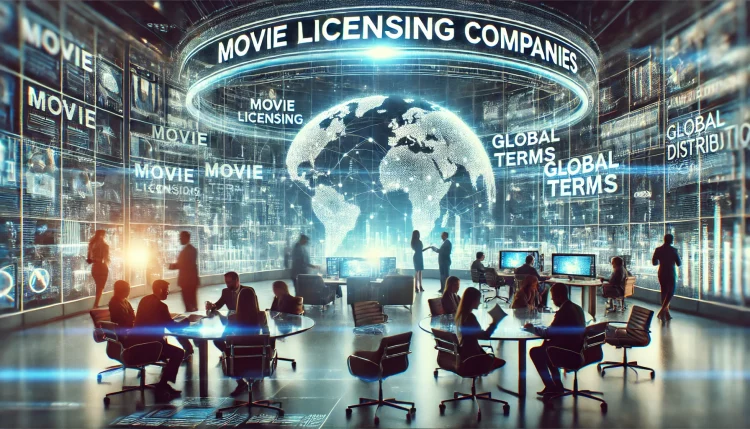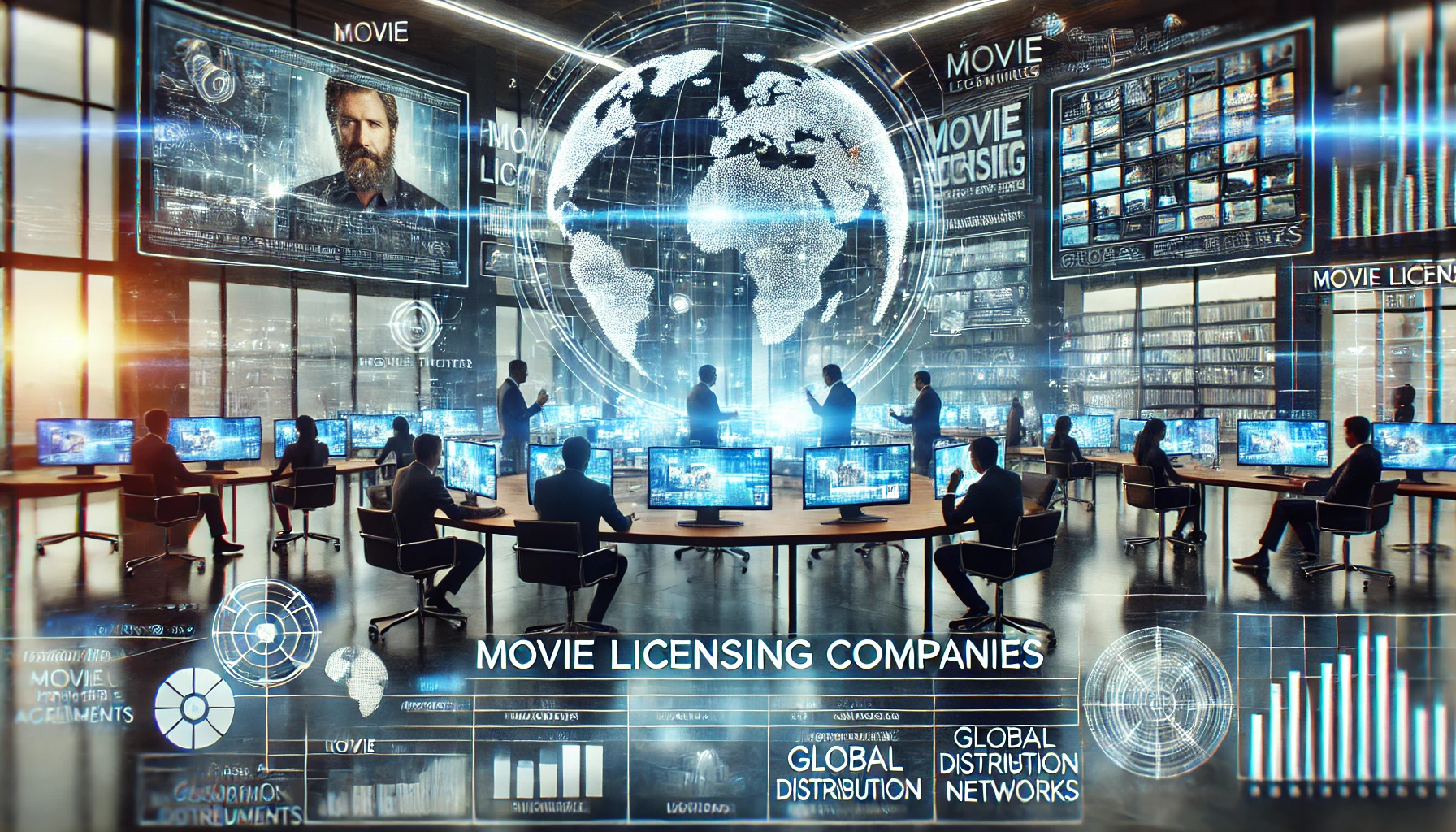The Crucial Role of Movie Licensing Companies
Movie licensing companies serve as the backbone of film distribution, playing a pivotal role in bringing cinematic creations to diverse audiences. These entities acquire the rights to distribute films across various mediums and territories, ensuring that movies reach their intended viewers through the most effective channels.
Historically, licensing was primarily focused on theatrical releases and home video. However, the digital revolution has expanded the scope of licensing to include streaming platforms, video-on-demand services, and international markets. This evolution has made the role of movie licensing companies more complex and crucial than ever before.
These companies navigate the intricate web of rights management, negotiating deals that can make or break a film’s success. They understand the nuances of different markets and platforms, tailoring licensing strategies to maximize a movie’s potential in each arena.
Ready to explore the world of movie licensing? Sign up on Vitrina to connect with industry experts and gain valuable insights!

Types of Movie Licensing Companies
The landscape of movie licensing companies is diverse, catering to different segments of the market. Understanding these categories can help filmmakers choose the right partner for their projects:
- Major Studio Licensors: These include powerhouses like Warner Bros. and Disney, which handle licensing for their vast libraries of content.
- Independent Licensing Agencies: Specializing in indie films and niche content, these companies help smaller productions reach wider audiences.
- International Licensing Firms: Focused on global distribution, these entities help films cross borders and cultures.
- Digital Rights Managers: Specializing in online and streaming rights, these companies navigate the complex world of digital distribution.
- Television Licensing Agencies: Concentrating on broadcast and cable rights, these firms help films transition to the small screen.
Each type of licensor offers unique advantages and specializes in different markets or mediums. Choosing the right movie licensing company can significantly impact a film’s reach and revenue potential.
Looking to connect with top licensors? Create your free Vitrina account and start networking with industry professionals today!
Curious how Vitrina can help you? Try it out today!
Trusted by global entertainment leaders to grow business, acquire high-demand content, promote projects and services, and track every Film + TV production worldwide
Find Your Ideal Licensor
Vitrina connects you with the right movie licensing companies for your project’s success
Key Players in the Movie Licensing Landscape
The world of movie licensing companies is competitive and ever-evolving. Here are some of the top players that have made a significant impact in recent years:
- Sony Pictures Licensing: Known for its vast library and global reach.
- Lionsgate Entertainment: A major player in both film and television licensing.
- MGM Worldwide Television Distribution: Specializing in licensing classic and contemporary films for television.
- Miramax: An independent powerhouse with a diverse portfolio of critically acclaimed films.
- FilmRise: A digital-native company focusing on multi-platform distribution.
These companies have proven track records of successfully licensing films across various platforms and territories. However, the landscape is always changing, with new players emerging and established ones adapting to industry shifts.
It’s important to note that while these are some of the well-known names, there are numerous other movie licensing companies that cater to specific niches or regional markets. For example, The Orchard specializes in independent film licensing, while Beta Film focuses on European content for global distribution.
To discover more about these companies and explore potential licensing partners, create your free account on Vitrina and connect with them for more detailed insights.
Ready to take your film’s distribution to the next level? Explore Vitrina’s network of movie licensing companies!
How Movie Licensing Companies Operate
Understanding the inner workings of movie licensing companies is essential for filmmakers looking to navigate the industry. Here’s a breakdown of their typical process:
- Acquisition: Licensors acquire rights to films through purchases or agreements with producers.
- Market Analysis: They assess the potential of films in various markets and platforms.
- Licensing Strategy: A comprehensive plan is developed for licensing the film across different mediums and territories.
- Negotiation: They work out deals with distributors, broadcasters, and platforms for licensing rights.
- Contract Management: Overseeing the execution of licensing agreements and ensuring compliance.
- Revenue Collection and Reporting: Tracking and distributing revenues from various licensing deals.
Movie licensing companies invest significant resources in market research and relationship building. They leverage their industry connections, analyze trends, and negotiate complex deals to maximize a film’s exposure and revenue potential.
The digital age has introduced new complexities to licensing, with companies now considering factors like geo-blocking, exclusive streaming rights, and multi-territory deals. This evolving landscape requires licensors to be agile and innovative in their approaches.
Want to learn more about the licensing process? Sign up on Vitrina to gain insider knowledge and connect with industry experts!
Master Film Licensing
Join Vitrina to understand the intricacies of movie licensing and boost your film’s distribution potential
Selecting the appropriate movie licensing company is a critical decision that can significantly impact your film’s success. Here are some factors to consider:
- Market Expertise: Look for companies with strong knowledge of your target markets.
- Platform Relationships: Consider their connections with various distribution platforms.
- Track Record: Evaluate their history of successful licensing deals in your film’s genre.
- Global Reach: Assess their ability to license your film in international territories.
- Contract Terms: Carefully review proposed agreements, including revenue splits and rights duration.
- Marketing Support: Some licensors offer marketing assistance to boost your film’s visibility.
It’s crucial to do thorough research and, if possible, speak with other filmmakers who have worked with the licensor. Remember that the biggest movie licensing companies aren’t always the best fit for every project. Sometimes, a smaller, specialized licensor might be better equipped to handle your film’s unique needs.
For instance, if you have a documentary about social issues, a company like Ro*co Films, known for its focus on impactful documentaries, might be a better fit than a major studio licensor that primarily handles mainstream content.
To explore your options and connect with potential licensors, create your free account on Vitrina and gain access to a network of industry professionals.
Ready to find the perfect licensor for your film? Let Vitrina guide you!
The landscape of movie licensing companies is rapidly evolving, driven by technological advancements and changing consumer behaviors. Here are some trends shaping the future:
- Blockchain Technology: Emerging as a potential game-changer for rights management and royalty tracking.
- AI-Driven Analytics: Advanced data analysis is helping licensors make more informed decisions about film potential.
- Global Market Expansion: Increasing focus on emerging markets and cross-cultural content.
- Hybrid Release Models: Flexible licensing strategies accommodating simultaneous releases across multiple platforms.
- Niche Content Boom: Growing demand for specialized content leading to more targeted licensing deals.
These changes present both challenges and opportunities for movie licensing companies. Adaptability and innovation will be key to success in this new era of film distribution and licensing.
As the industry evolves, new players are emerging to meet the changing demands. For example, companies like Vuulr are creating digital marketplaces for content rights, streamlining the licensing process for buyers and sellers globally.
To stay ahead of these trends and connect with forward-thinking licensors, create your free account on Vitrina and tap into a wealth of industry knowledge and connections.
Stay ahead of the curve in film licensing with Vitrina!
Embrace the Future of Licensing
Join Vitrina to keep pace with evolving trends and connect with innovative movie licensing companies
Vitrina plays a crucial role in connecting filmmakers with the right movie licensing companies for their projects. As a comprehensive platform for the entertainment industry, Vitrina offers several key benefits:
- Industry Insights: Access up-to-date information on licensing trends and company profiles.
- Networking Opportunities: Connect directly with representatives from various licensing companies.
- Discovery Tools: Find lesser-known licensors that might be perfect for your niche film.
- Educational Resources: Learn about the licensing process and best practices from industry experts.
- Deal Preparation: Get guidance on how to navigate licensing negotiations effectively.
Vitrina is not just a tool but a dynamic platform that provides valuable insights, facilitates connections, and enables the discovery of companies related to the entertainment industry. Whether you’re looking to connect with major players or find boutique licensors specializing in your film’s genre, Vitrina can help streamline your search and increase your chances of finding the right partner.
For example, if you’re an independent filmmaker with an arthouse drama, Vitrina can help you discover and connect with companies like Magnolia Pictures or IFC Films, known for their support of unique, independent projects.
To explore the full potential of your film’s licensing, create your free account on Vitrina and start your journey towards finding the perfect movie licensing company for your project.
Maximize your film’s licensing potential with Vitrina!
Summary
In this comprehensive guide, we’ve explored the world of movie licensing companies , their crucial role in the film industry, and how they operate. We’ve discussed the various types of licensors, from major studio entities to independent specialists, and highlighted some key companies that have made significant impacts in recent years. The article also delved into how these companies function, offering insights into their acquisition, strategy development, and licensing processes.
We emphasized the importance of choosing the right licensor for your film, providing factors to consider and tips for making this critical decision. Looking towards the future, we examined emerging trends that are shaping the licensing landscape, including the rise of blockchain technology and the increasing importance of global markets.
Throughout the article, we highlighted how Vitrina can assist filmmakers in navigating this complex industry. As a platform that offers insights, connections, and discovery tools, Vitrina is an invaluable resource for anyone looking to understand and engage with movie licensing companies.
Remember, the world of film licensing is constantly evolving, and staying informed and connected is key to success. Whether you’re an established filmmaker or just starting out, understanding the licensing landscape can significantly impact your film’s journey from production to worldwide audience reach.
Movie licensing companies acquire and manage the rights to distribute films across various platforms and territories. They negotiate deals with broadcasters, streaming services, and other distributors to ensure films reach their intended audiences. These companies play a crucial role in maximizing a film’s revenue potential and global reach.
Choosing the right licensor involves considering factors such as their market expertise, platform relationships, track record with similar films, global reach, and proposed contract terms. It’s important to research thoroughly and, if possible, speak with other filmmakers who have worked with the company. Platforms like Vitrina can help you connect with and evaluate potential licensors.
Digital streaming has significantly impacted the licensing landscape. Many companies now focus on multi-platform licensing strategies, including simultaneous releases across theaters and streaming platforms. This has led to more complex licensing agreements and the need for licensors to adapt to rapidly changing consumer behaviors and technologies.
While it’s more challenging, independent filmmakers can work with major licensors. This often happens through film festivals, markets, or with the help of sales agents. However, many independent filmmakers find better success with smaller, specialized licensors that focus on indie films. Networking platforms like Vitrina can help filmmakers connect with a range of licensors, from majors to independents, suitable for their specific needs.



























